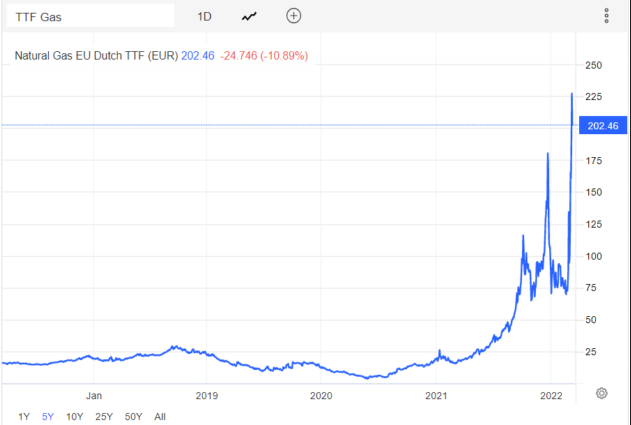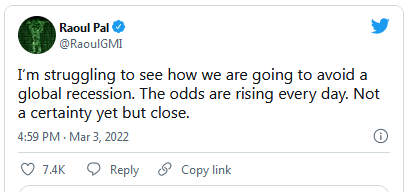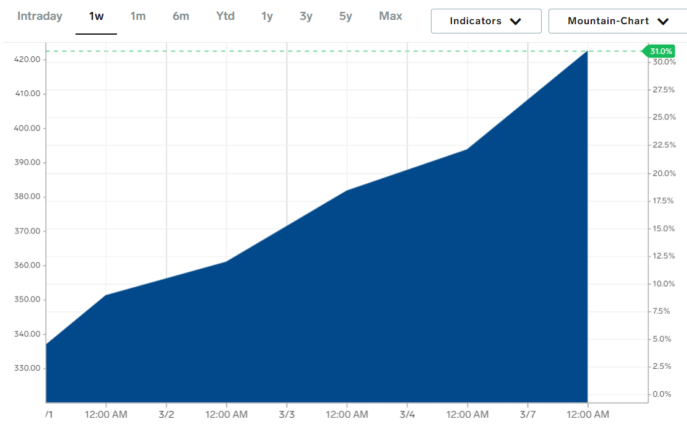Surging commodity prices may tip the world into a recession, diminishing the prospects of risk-on assets like cryptocurrencies.
Key Takeaways
- Commodities like oil, gas, wheat, and precious metals have soared in price due to supply-side shocks caused by the Russia-Ukraine conflict.
- Soaring commodity prices could lead to a global recession, painting a bleak long-term market outlook for risk-on assets like Bitcoin.
- Investors appear to be showing interest in precious metals like gold and palladium, which are trading near or beyond their historic highs.
Oil, gas, wheat, and precious metals are soaring and adding inflationary pressure to already-high CPI inflation numbers. Historically, such surges in energy and oil prices have led to global recessions, which have typically had a negative impact on risk-on assets such as stocks and cryptocurrencies.
Russia-Ukraine Conflict Sends Commodities Soaring
Global economies had barely begun recovering from the COVID pandemic that resulted in over two years of intermittent lockdowns, severe supply chain issues, unprecedented money printing, and record-high inflation rates before facing another global crisis triggered by Russia’s invasion of Ukraine.
Now, the war in Ukraine and the anticipation of supply-side shortages it has triggered has sent commodity prices soaring near or beyond record highs.
Meanwhile, the wholesale natural gas price in Europe, another commodity heavily affected by the Russia-Ukraine conflict, has soared way past the all-time highs it made in December to €207 (around $225) per megawatt-hour, up 1,000% since March 2021. The price jumped as high as €267 (around $290) per megawatt-hour on the day Tuesday after temporarily hitting an all-time high of €345 (around $375) Monday as Russia threatened the old continent that it would turn off the valve.

Europe imports roughly 25% of its oil and 40% of its natural gas from Russia and is almost entirely at the mercy of its neighbor when it comes to the two energy commodities. Moreover, soaring energy costs threaten to push global prices of production goods even higher, slowing growth and potentially tipping the world into a recession.
The acclaimed macroeconomics expert and investor Raoul Pal is one of many analysts to have warned that a recession is likely amid the Russia-Ukraine crisis, remarking in a Mar. 3 tweet that "the odds are rising every day."

A recession is an economic contraction or a general decline in economic activity. Stocks and other risk-on assets tend to fare badly in recessions. To that point, equities have already seen significant corrections from their all-time highs. For example, the FTSE 100 index tracking the 100 largest companies listed on the London Stock Exchange has dipped 5% over the last five days. The Dow Jones and S&P 500 indices dipped 2.37% and 2.95% yesterday.
To make matters worse, Russia and Ukraine are among the largest wheat producers in the world, accounting for almost a third of the world’s wheat exports. However, since the Russian assault on its smaller neighbor, wheat production and exports have come to a virtual standstill, leading prices to soar over 31% in a week and well beyond their previous all-time highs to €422 (around $459) per tonne.
Russia is also one of the largest fertilizer exporters globally, leading to a significant surge in global fertilizer prices. As fertilizer is essential for farming food, the surging prices directly impact food costs.

The price of base metal nickel, another of Russia’s largest exports, has also skyrocketed to over $100,000 per tonne Tuesday, leading the London Metal Exchange to halt trading for the remainder of the day. The nickel price on Mar. 1 was about $26,000 per tonne.
Soaring food and energy commodity prices and the bleak long-term outlook for equities appear to have prompted investors to seek refuge in precious metals. Gold has rallied 3.58% over the last five days and was trading at $2,014 per ounce, steadily nearing its record high of $2,074 recorded in August 2020. Palladium briefly hit a high of $3,440 on Monday amid fears of supply disruptions and was trading around the $3,000 mark.
While physical gold is nearing all-time highs, the market seems to have decided that crypto’s so-called "digital gold"—Bitcoin—is more of a risk-on asset than a "safe haven." Similar to many traditional stocks, Bitcoin and the broader crypto market has taken a beating over the last few weeks. At time of writing, the top crypto was trading at around $38,700, around 43.7% down from its November peak.
